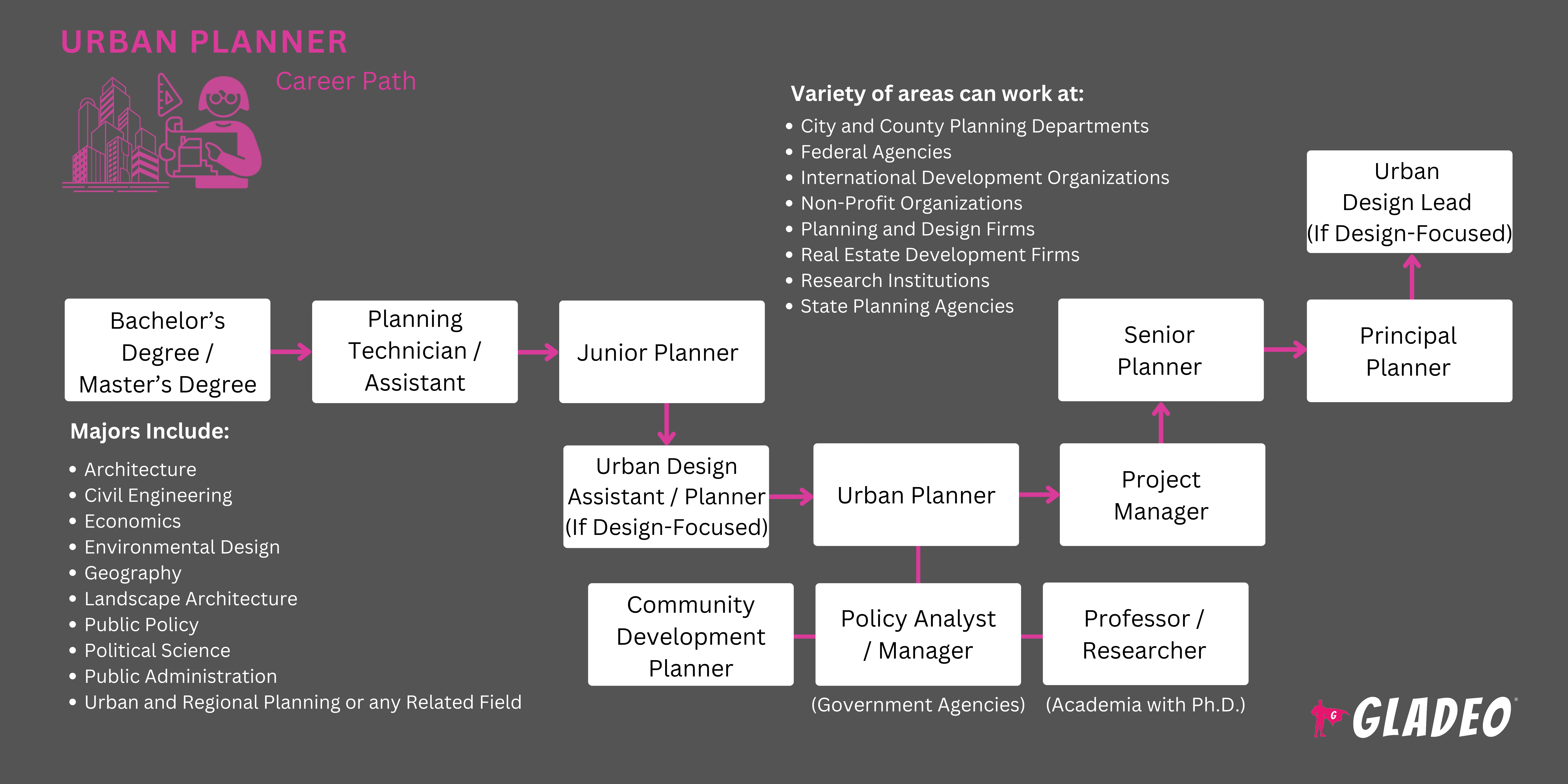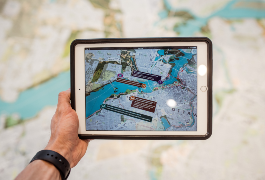聚光灯
城市规划师、社区发展规划师、社区规划师、发展技术员、住房发展专家、邻里规划师、规划师、规划顾问、规划技术员、区域规划师
Urban Planners literally shape the communities we live in through strategic planning and policy development! For instance, they separate commercial and industrial zones from residential areas to minimize noise, traffic, and pollution, helping to reduce congestion and enhance livability. They also design public spaces, parks, and recreational areas to foster healthier, more vibrant communities.
Their work ensures that towns and cities grow in ways that balance functionality, sustainability, and quality of life. Every day, Urban Planners tackle a range of issues, from zoning land for specific uses to improving infrastructure, addressing overcrowding, and promoting environmental sustainability.
Beyond physical planning, they develop strategies to ensure housing, transportation, and public services all work together effectively. They also conduct research, analyze data, and collaborate with public officials, developers, and community members to make informed decisions that benefit citizens and the environment!
- Playing a key role in solving complex urban issues and challenges
- Improving living standards through effective planning and development
- Engaging with stakeholders to shape the future of urban areas
- Promoting sustainable, environmentally friendly growth
工作日程
Urban Planners typically work full-time, with occasional evenings and weekends to attend community meetings. They may work in government offices, consulting firms, or non-profit organizations.
典型职责
- Analyze data to assess community needs and growth trends.
- Coordinate with architects, engineers, and economic consultants. Collaborate with local government officials, developers, and interest groups.
- Conduct field investigations and surveys to evaluate land use factors and determine appropriate zoning classifications, such as:
- 住宅
- 商业
- 工业类
- Recreational
- Open space
- Investigate property availability for development opportunities. Develop and implement land use plans and policies. Assess environmental impacts of proposed developments.
- Design maps, site plans, and approval documents. Review and evaluate site plans for compliance with regulations.
- Recommend project approvals or modifications based on feasibility studies, ensuring projects align with community goals and long-term strategies.
- Develop transportation plans to improve mobility and reduce congestion.
- Oversee sustainability initiatives to reduce pollution and improve energy efficiency.
- Facilitate public engagement via meetings, surveys, and forums to gather input and discuss proposals. Mediate disputes related to land use projects.
- Provide legal guidance and develop regulatory strategies.
Contribute to policy updates. - Assist developers in obtaining project approvals. Review and authorize building permits and business licenses in compliance with zoning/land-use regulations.
- Draft and present budgets and reports for community development initiatives.
- Assess project safety considerations.
- Develop and implement affordable housing strategies and emergency response plans for natural disasters such as floods, earthquakes, and hurricanes.
额外责任
- Use Geographic Information System (GIS) software to analyze data.
- Secure funding through grant applications.
- Monitor changes in zoning laws, building codes, and environmental policies.
- Supervise urban planning technicians or support staff.
- Advocate for responsible urban development and smart growth policies.
- Educate communities on health, safety, and environmental concerns.
软技能
- 适应性
- 分析性思维
- 注重细节
- 沟通
- 解决冲突
- 创造性
- 批判性思维
- 决策
- 人际交往技巧
- 领导人
- 谈判
- 客观性
- 组织能力
- 坚持不懈
- 解决问题
- 团队合作
- 时间管理
技术技能
- 预算编制
- 计算机辅助设计
- Data analysis (for analyzing demographic, economic, and environmental data)
- Environmental impact analysis
- Geographic Information Systems programs such as Esri ArcGIS
- Local, state, and federal zoning laws
- 项目管理
- Public policy knowledge
- 日程安排
- Technical writing
- Transportation planning
- Urban design principles
- Local and regional government agencies
- Architectural and engineering firms
- Environmental organizations
- 房地产开发公司
- 咨询公司
Urban Planners juggle the often-competing interests of government officials, developers, and community members while ensuring projects comply with zoning laws, environmental regulations, and economic constraints. Balancing these factors requires diplomacy, problem-solving skills, and an understanding of policy and urban design principles.
The job can be demanding, with tight deadlines, extensive research requirements, bureaucratic red tape, and the need to present and defend proposals in public forums. Political and social pressures can make decision-making complex, and Urban Planners often have to mediate disputes and negotiate compromises. Despite the challenges, the chance to shape communities, improve infrastructure, and promote sustainable growth makes it a rewarding job for anyone who is passionate about urban development!
Sustainability is at the forefront of modern urban planning. Green infrastructure, renewable energy initiatives, and climate-resilient development are now standard practices as cities work to reduce carbon footprints and adapt to climate change. Planners are also prioritizing walkable neighborhoods, mixed-use developments, and smart city innovations to create more livable urban environments.
Meanwhile, public participation is growing thanks to digital platforms and social media making engagement more accessible and transparent. Virtual town halls, online surveys, and interactive mapping tools allow residents to stay better informed and offer more meaningful input.
Planning is evolving thanks to artificial intelligence streamlining data analysis and enabling planners to model urban growth, optimize land use, and predict environmental impacts.
Urban Planners often enjoyed organizing and designing from a young age. They may have had a passion for drawing, geography, environmental science, or even community service projects.
- Most positions require a master’s degree in urban or regional planning from a Planning Accreditation Board (PAB)-accredited program. PAB accredits 80 master’s and 16 bachelor’s programs at 84 universities.
- An undergraduate major in urban planning is helpful, but other majors may include geography, public policy, or even architecture.
- Common coursework in urban planning programs includes:
- 建筑规范
- Community Development
- Economic Development
- Environmental Planning and Regulations
- 地理信息系统(GIS)
- Land Use Law
- Planning Theory
- Public Policy Analysis
- Sustainable Development
- Transportation Planning
- Urban Design
- Zoning Laws
- Entry-level roles may only require a degree, but more advanced positions may require certification from the American Institute of Certified Planners (AICP).
- To be eligible for certification testing, Planners must have one of the following:
- Graduate degree in planning from a PAB-accredited program, plus two years of professional planning work experience;
- Graduate degree in planning from a non-PAB-accredited program, plus three years of professional planning work experience;
- Bachelor’s degree in planning from a PAB-accredited program, plus three years of experience;
- Any other graduate or undergraduate degree, plus four years of experience; or
- No college degree, plus eight years of experience.
- Once certified by AICP, Planners have to earn Certification Maintenance (CM) credits and log them into AICP’s database to keep their certification current.
- CM credits can be earned through a variety of ways, including:
- Attending or presenting at APA conference events, sessions, workshops, and webcasts
- APA Learn online courses
- Writing and publishing articles or books
- Gaining practical experience through internships or related work in fields such as architecture, public policy, or economic development is also valuable.
- Note, New Jersey requires Urban Planners to be licensed.
- Ideally, Urban Planners should seek Planning Accreditation Board (PAB)-accredited undergraduate and graduate programs in Urban and Regional Planning or related majors.
- PAB accreditation isn’t a hard requirement but it’s helpful for obtaining American Institute of Certified Planners (AICP) certification.
- Look for programs taught by experienced faculty, offering hands-on experience or opportunities for internships, and featuring partnerships with local government agencies and planning firms.
- Consider the cost of tuition, discounts, and local scholarship opportunities (in addition to federal aid via the FAFSA).
- Take courses in geography, environmental science, economics, government, architecture, and urban studies. Advanced placement classes in these subjects can be useful to prepare for college.
- Work on your soft skills like teamwork, problem solving, and conflict resolution by participating in extracurricular activities.
- Gain project management and other experience through internships or part-time jobs with city planning departments, architectural firms, transportation agencies, or environmental organizations.
Learn how to use Geographic Information Systems and programs for data analysis, urban design, and map-making. - Build a portfolio showcasing your skills in research, planning proposals, maps, and community development work.
- Stay informed about industry trends, zoning laws, and emerging technologies by reading publications like Planning magazine and watching educational videos.
- Request an informational interview with a working Urban Planner. Job shadowing for a day is a great way to gain insights into the field!
- Start networking by joining professional organizations like the American Planning Association.
- Maintain relationships with professors, mentors, and colleagues who can provide career guidance and serve as references for future opportunities.

- Search job portals like Indeed.com, Glassdoor, Monster, SimplyHired, ZipRecruiter, USAJOBS, and city or state websites.
- Prepare a strong Urban Planner resume that uses keywords from job postings, such as:
- Community Development
- Environmental Sustainability
- GIS Mapping
- Infrastructure Planning
- Land Use Analysis
- Public Policy
- Stakeholder Engagement
- Transportation Planning
- Urban Planning
- Zoning Regulations
- If you don’t have enough experience, apply for assistant roles, internships, or apprenticeships.
- Use your school’s career center for help with resumes, mock interviews, and job searching.
- Review common interview questions to be prepared. Sample interview questions might include things like “How do you approach balancing economic development with environmental sustainability in urban planning?” or “Can you describe a time when you had to mediate a conflict between stakeholders with opposing interests on a planning project?”
- Practice mock interviews to gain confidence.
- Before interviews, brush up on terminology and familiarize yourself with local challenges such as traffic congestion or overcrowded public areas.
- During interviews, show genuine enthusiasm for planning and share details about your areas of specialization, if any.
- Dress appropriately for interviews.
- Ask your supervisor for guidance on career planning. Let them know you’re interested in moving up and are willing to tackle increasingly complex projects.
- Join professional organizations, publish articles, speak at conferences, and participate in industry events.
- Get certified by AICP once you have enough years of experience.
- Pursue advanced degrees or specialized training to tackle hot issues like revitalization projects, population changes, housing needs, schools, transportation, road maintenance, environmental concerns, and resource availability.
- Take on leadership roles in community projects and planning initiatives.
- Stay updated with the latest trends and technologies in urban planning.
- Build strong relationships with regulatory agencies.
- Seek mentorship from experienced planning professionals.
- Keep track of internal job opportunities, and watch for external openings, if necessary to move up. Note, you might have to relocate to advance your career.
网站
- 美国建筑师协会
- 美国注册规划师协会
- 美国规划协会
- 美国公共工程协会
- 美国景观设计师协会
- Association of Collegiate Schools of Planning
- Congress for the New Urbanism
- GIS Lounge
- Institute of Transportation Engineers
- National Community Development Association
- National Trust for Historic Preservation
- Planetizen
- 规划师网络
- Planning Accreditation Board
- 运输与发展研究所
- Urban and Regional Information Systems Association
- Urban Land Institute
书籍
- The Sustainable Urban Design Handbook, by Nico Larco and Kaarin Knudson
- The Urban and Regional Planning Reader, by Eugenie Birch
- Urban Planning & Urban Studies Step by Step: Understanding Cities & Urban Development in the Modern World, by Michael Montgomery
If a career in urban planning isn’t quite an exact match for your interests, consider other options such as:
- 建筑师
- 棕地重建专家
- 制图员
- Chief Sustainability Officer
- 土木工程师
- Climate Change Policy Analyst
- Community Development Specialist
- 保护科学家
- 经济学家
- Environmental Consultant
- Environmental Restoration Planner
- 地理学家
- Geographic Information Systems Analyst
- 工业生态学家
- 景观设计师
- 市场研究分析员
- Political Scientist
- 项目管理专家
- Real Estate Developer
- 测量员
- 交通规划师
新闻联播

特色工作

在线课程和工具

年薪预期
New workers start around $63K. Median pay is $81K per year. Highly experienced workers can earn around $102K.






